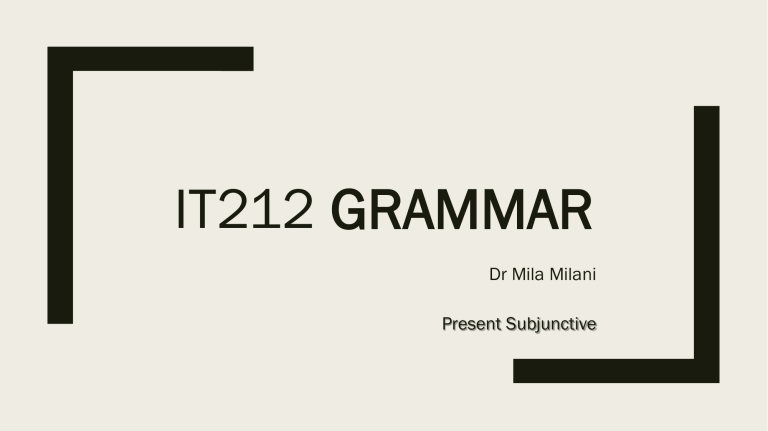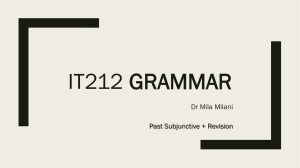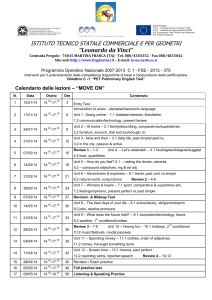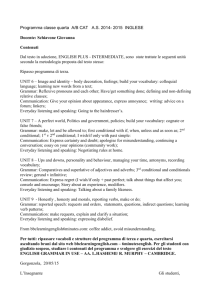IT212 GRAMMAR Dr Mila Milani Present Subjunctive

IT212 GRAMMAR
Dr Mila Milani
Present Subjunctive
Today’s class
■ Warm-up: conditional
■ Individual self-assessed test – Conditional
■ Lecture: Present Subjunctive
■ Exercises on Subjunctive (in pairs or groups)
■ Next week: Congiuntivo passato (Past Subjunctive)
Conditional
■ Use the correct form (conditional past or present) of the verbs given.
■ (a) Ti ( dare un passaggio ), ma devo andare a prendere mia figlia.
■ darei
■ (b) ( Tradurre ) l’articolo ma era troppo tardi.
■ avrei tradotto
■ It expresses a desire that did not finally take place / or something that could or shouls have happened but did not .
■ (c) Il vino lo ( bere ) volentieri, ma prendo antibiotici.
■ berrei
■
There are some instances where in Italian the use of the conditional differs significantly from the English.
■
The ‘future in the past’
■
Referring to events which could take place
■
When used in reported speech in a past tense narrative, the Italian perfect conditional may express events and situations which could actually take place.
■
Notice that in English a simple conditional is used.
■ Direct speech Indirect speech
■ ‘Sono sicuro che verranno ’
■ ‘I am sure they will come’
■ ‘Il treno potrebbe arrivare in ritardo’
■ ‘The train could/may/might arrive late’
■ Ero sicuro che sarebbero venuti
■ I was sure they would come
■ Disse che il treno sarebbe potuto arrivare in ritardo
■ He said the train could/may/might arrive late
Self-assessed test on Conditional
■ Worksheet (also uploaded to Lecture notes)
■ This is OPTIONAL, but it is very useful to test if you need more revision on that particular grammar topic or not.
■ If you have any queries or doubts, these are my office hours
■ Term 2: Tuesdays (weeks 1-5; 7-10), 1.30-3.30pm
■ For further updates, please check my webpage: https://www2.warwick.ac.uk/fac/arts/modernlanguages/people/academic/milani/
■ If unable to make these times, please email me to arrange a meeting at another convenient time:
■ m.milani@warwick.ac.uk
Congiuntivo ( Subjunctive )
■ The subjunctive is a mood to express a wish, hope, uncertainly or other similar attitude toward a fact or an idea. Since it stresses the speaker’s feelings about the fact or idea, it expresses a
‘subjunctive’ point of view.
■ In ENGLISH, the subjunctive is only used in a very few constructions.
■ I wish you were here with me! (a wish that is not possible)
■ I asked that Maria be present (after verbs of asking, demanding, and requesting)
■ If I were in Europe, I would buy a villa in Greece (hypothetical statements)
Congiuntivo ( Subjunctive )
■ In ITALIAN, the subjunctive is used more frequently .
■ The subjunctive is also found after
■ Verbs of opinion – PENSARE , CREDERE, SEMBRARE, PARERE
■ Pensiamo che mamma abbia ragione
We think that mother is right
■ Verbs of emotion – TEMERE
■ Temo che Marco non arrivi in tempo
I am afraid that Marco will not arrive on time
■ Verbs of wish, command – VOLERE, ORDINARE, SPERARE
■ Teresa vuole che il marito cucini
Teresa wants her husband to cook
■ È essenziale che tu vada subito a farti vedere dal medico it’s essential that you go to see a doctor
■ Verbs of doubt – DUBITARE, SUPPORRE, NON ESSERE SICURO, SEMBRARE
■ Dubito che vinciate la partita
I doubt that you will win the game
■ Impersonal verbs or expressions + che + subjunctive
■ Sembra che i miei amici partano per l’Europa
It seems that my friends are leaving soon for Europe
■ È possibile che papa compri una macchina nuova
It is possible that Dad will buy a new car
Congiuntivo
■ There are FOUR forms of the subjunctive in ITALIAN
■ PRESENTE (present)
■ PASSATO (past)
■ IMPERFETTO (imperfect)
■ TRAPASSATO (past perfect)
Subjunctive ( PRESENT )
■ In ITALIAN, the subjunctive is formed from the present indicative – which means that all verbs are irregular in the present tense, they have the same form of irregularity in the present subjunctive
■ Conjugation - Regular
Prima coniugazione: parlare
Seconda coniugazione: ricevere Terza coniugazione: dormire io parli tu parli lei/lui parli noi parliamo voi parliate essi/loro parlino io riceva tu riceva lei/lui riceva noi riceviamo voi riceviate essi/loro ricevano io dorma tu dorma lei/lui dorma noi dormiamo voi dormiate essi/loro dormano
■ Please note that the endings for the 1 st , 2 nd and 3 rd person singular are the same
■ Conjugation - Irregular page 170 Italian Grammar in Practice
In-class exercises
■ Change the subject. Rewrite the last part of the second sentence using the appropriate verb form.
■ Mi dispiace non poter venire.
■ Mi dispiace che lei....
non possa venire .........................
■ Non credo di riuscire a fare in tempo
■ Non credo che lui...
riesca a fare in tempo ..........
■ Prima di andare via voglio parlarti
■ Prima che tu....
vada via voglio parlarti ...........
In-class exercises
■ Select the correct form of the verb – Beware, not all of the sentences require a subjunctive verb.
■ (a) Sono sicuro che Anna è /sia felice
■ (b) Non credo che lui sia /è antipatico
■ (c) Si dice che lui abbia /ha molti soldi
■ (d) Spero che lui torni /torna
■ (e) Ho paura che sia /è troppo tardi.
In-class exercises
■ You tell others what needs to happen. Express the English in Italian
■ Nicola, non hai pagato l’affitto. It’s essential that you pay it soon
■ È essenziale/ Bisogna che tu lo paghi in fretta
■ Non sapete se verrete domani? But it’s necessary for me to know today
■ Ma è necessario/ bisogna che io lo sappia oggi
■ Silvana e Giorgio non hanno spedito il pacco? It’s important that they send it.
■ È importante che lo spediscano
Homework exercises
■ For week 4
■ GRAMMAR CLASS: Congiuntivo passato, aggettivi e pronomi indefiniti
- Grammar topic to be discussed in class in week 4: congiuntivo passato (past subjunctive)
Reference related to subjunctive ( Italian Grammar in Practice ): chapter 25
Reference related to indefinite pronouns and adjectives ( Italian Grammar in
Practice ): chapter 25
■ - Homework due in class in week 4, related to congiuntivo presente (see week 3 for reference): ex. 1-2-3-4 pages 44-45 ( Italian Espresso 2 – Workbook)
■ - OPTIONAL homework, related to congiuntivo presente (see week 3 for reference): ex. 8-10 page 46-47 ( Italian Espresso 2 - Workbook )


